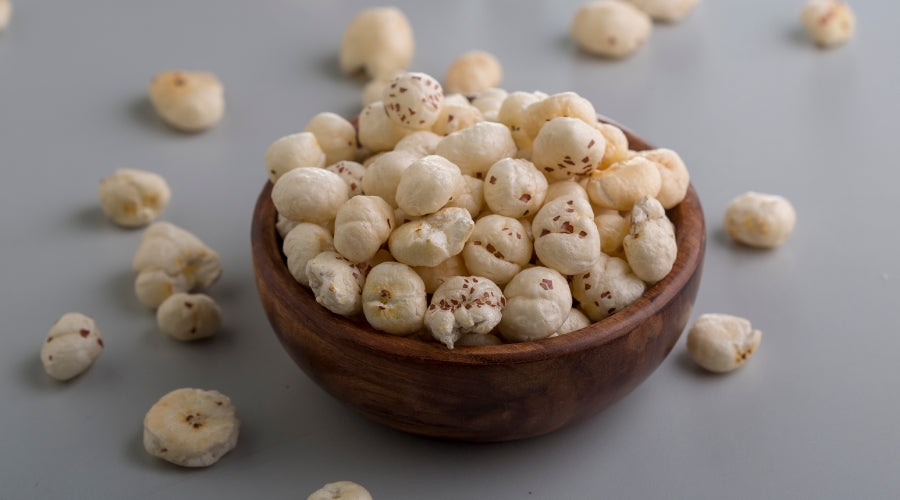Introduction
When it comes to healthy snacking options, makhana, also known as fox nuts or lotus seeds, has gained immense popularity. As people search for snacks that not only satisfy their taste buds but also offer health benefits, makhana stands out due to its nutritional profile. However, a common query that often arises is: does makhana cause constipation?
What is Makhana?
Makhana is the seed of the Euryale Fox, a plant that grows in water and is primarily found in India. These seeds are harvested and then roasted to produce a crunchy snack. Rich in protein, carbohydrates, and fibre, makhana is a favourite among health-conscious individuals.
Nutritional Profile of Makhana
Before delving into whether makhana causes constipation, it's important to understand its nutritional content. Makhana is low in calories but high in fibre—a crucial element for digestive health. It also contains significant amounts of magnesium, potassium, and antioxidants, making it a nutritious snack option.
Does Makhana Cause Constipation?
The question of whether makhana causes constipation is significant for many, especially for those who are more susceptible to digestive issues. Given its high fibre content, makhana is generally considered beneficial for the digestive system. Fibre aids in the smooth movement of food through the digestive tract and helps maintain bowel health. Therefore, in moderate amounts, makhana should not cause constipation; rather, it can help prevent it.

However, as with any food, the key is moderation. Overconsumption of makhana could potentially lead to digestive discomfort, including constipation, primarily if one does not consume adequate fluids. Fibre works best when it absorbs water, making the stool soft and easier to pass. Without enough liquid, the high fibre content in makhana could lead to harder stools and, consequently, constipation.
Benefits of Makhana for Digestive Health
High in Fiber:
Makhana is a rich source of dietary fibre, which plays a pivotal role in maintaining digestive health. Fibre helps to bulk up the stool and promotes more regular bowel movements, which is crucial for preventing constipation. Regular consumption of fibre-rich foods like makhana can aid in maintaining a smooth and regular digestion process, potentially reducing the risk of common gastrointestinal troubles such as constipation and irregular bowel syndrome.
Rich in Antioxidants:
The antioxidants present in makhana, particularly flavonoids, contribute significantly to its health benefits. These antioxidants help in combating oxidative stress and reducing inflammation within the body, including the digestive tract. Such anti-inflammatory properties can be particularly beneficial in managing and preventing conditions like inflammatory bowel disease (IBD) and other related disorders. The presence of these compounds helps in soothing the digestive tract, fostering a healthier gut environment.
Low Calorie:
Makhana is also notable for being a low-calorie snack, which makes it an ideal choice for weight management. Maintaining a healthy weight is crucial as obesity can be a risk factor for various digestive issues, including gastroesophageal reflux disease (GERD) and gallstones. The low-calorie nature of makhana allows it to be a satisfying snack that can be included in a weight management diet without contributing excessively to daily calorie intake, thereby supporting overall digestive health.
Potential Drawbacks
While the benefits are significant, it’s crucial to consider potential drawbacks if consumed excessively:
Digestive Overload:
While the high fibre content of makhana is beneficial for digestion, excessive intake can lead to an imbalance. Consuming a large amount of fibre without sufficient hydration may result in digestive overload, potentially causing constipation rather than alleviating it. The body requires adequate water to process fibre effectively, as water helps fibre move through the digestive system more smoothly. Without enough water, the high fibre content in makhana can absorb bodily fluids, leading to hardened stools that are difficult to pass.
Caloric Intake:
Makhana is praised for being a low-calorie snack, which aids in weight management. However, like any food, consuming makhana in excessive quantities can lead to an increased caloric intake. Over time, this can contribute to weight gain. Since maintaining a healthy weight is essential for optimal digestive health, it's important to moderate the consumption of even low-calorie snacks like makhana. Unchecked caloric intake, even from healthier snacks, can accumulate and lead to obesity, which is associated with various digestive issues including constipation and increased risk of gastroesophageal reflux disease (GERD).
How to Include Makhana in Your Diet
To enjoy the benefits of makhana without the risk of constipation, here are some tips:
Moderation is Key:
Makhana is rich in dietary fibre, which is beneficial for digestion. However, consuming too much fibre can lead to digestive issues such as constipation, bloating, or gas. To avoid these problems, it's essential to consume makhana in moderation. A reasonable serving size is about a cup of popped makhana, which provides a good balance of fibre without overwhelming your digestive system.
Stay Hydrated:
Increasing your fibre intake, whether from makhana or other sources, can impact your digestion, particularly if you're not accustomed to consuming high-fibre foods. Fibre absorbs water in the digestive tract, which can bulk up stool and promote regular bowel movements. However, if you're not adequately hydrated, fibre can have the opposite effect and lead to constipation. Therefore, it's crucial to increase your water intake along with consuming makhana to ensure smooth digestion. Aim to drink plenty of water throughout the day, especially when you're eating fibre-rich foods.
Diverse Diet:
While makhana is a nutritious snack option, it's essential to incorporate it into a balanced diet that includes a variety of fibre sources. Relying solely on makhana for your fibre intake may lead to dietary imbalances and nutrient deficiencies. Instead, complement makhana with other high-fibre foods such as fruits, vegetables, whole grains, legumes, and nuts. This diverse diet not only ensures that you're meeting your fibre needs but also provides a wide range of essential nutrients, antioxidants, and phytochemicals that contribute to overall health and well-being.
Comparing Makhana with Other Fiber Sources
When discussing the effects of makhana on digestion, especially constipation, it's helpful to compare it with other high-fibre foods. Foods like oats, barley, and legumes are known for their significant fibre content, which plays a crucial role in promoting healthy digestion and preventing constipation. Here’s a detailed look at how makhana stacks up against these foods:

Fibre Content Comparison:
Oats: Oats are a very rich source of soluble fibre, particularly beta-glucan, which can absorb water and form a gel-like substance in the gut. This not only softens the stool but also slows digestion, which can be beneficial for maintaining longer satiety and stabilizing blood sugar levels.
Barley: Like oats, barley is high in both soluble and insoluble fibres. It also contains beta-glucan, which has similar benefits to the beta-glucan in oats. Additionally, the insoluble fibre in barley adds bulk to the stool, enhancing digestive health.
Legumes (beans, lentils, chickpeas): Legumes are another excellent source of fibre, providing both soluble and insoluble types. They are particularly high in fibre, with a typical serving contributing significantly to the daily fibre requirement. This high fibre content is excellent for promoting regular bowel movements and preventing constipation.
Impact on Digestion:
Oats, Barley, and Legumes: These foods not only prevent constipation but also offer additional digestive benefits such as improved gut health due to their prebiotic fibres (which feed the beneficial gut bacteria) and a reduced risk of digestive disorders.
Nutritional Benefits Beyond Fiber:
Oats: Oats are well-known for their heart health benefits, primarily due to their soluble fibre content, which can help lower cholesterol.
Barley: Barley can also help reduce cholesterol levels and is rich in vitamins and minerals, including selenium, which supports thyroid function.
Legumes: They are a powerhouse of nutrition, providing protein, iron, folate, and other essential nutrients, which make them particularly valuable in vegetarian and vegan diets.
Makhana in Traditional Medicine
Role in Ayurveda:
In Ayurvedic medicine, makhana is often recommended for its light and nourishing properties. It is classified as having a sweet taste and a cooling potency, which makes it ideal for balancing the Pitta and Vata doshas. Ayurveda emphasizes the importance of digestive health in overall wellness and often prescribes makhana for its easy digestibility and gentle effect on the stomach. It's commonly used to treat conditions like diarrhoea and dysentery, and because of its fibre content, it's also used to prevent and manage constipation without aggravating the gut.
Nutritional Support for Digestive Health:
The traditional uses of makhana are supported by its nutritional profile. Being high in fibre, makhana helps in regular bowel movements by adding bulk to stool and ensuring it passes smoothly through the digestive tract. This prevents constipation, a common issue in both modern and traditional perspectives on health. Additionally, makhana is low in calories yet rich in important minerals such as potassium and magnesium, which further support overall health.
Contemporary Relevance:
The traditional uses of makhana align well with contemporary dietary advice that emphasizes the importance of fibre in digestive health. Modern research into functional foods and nutraceuticals often revisits these traditional beliefs to validate their claims and understand the mechanisms behind them. This blend of historical wisdom and modern science helps in broadening the understanding of how traditional foods like makhana can be incorporated into current diets for their health benefits.
Preparing Makhana for Optimal Digestive Benefits
To leverage the benefits of makhana without asking, "Does makhana cause constipation?" it should be prepared properly. Roasting makhana makes it easier to digest and enhances its flavour.
Who Should Avoid Makhana?
While discussing "Does makhana cause constipation?" it's also necessary to consider who might need to limit its intake. People with specific dietary restrictions or bowel disorders should consult with a healthcare provider before adding makhana to their diet.
Conclusion
In conclusion, does makhana cause constipation? Generally, the answer is no, especially when consumed in moderation and alongside adequate fluid intake. Makhana can be a beneficial part of a diet aimed at maintaining or improving digestive health due to its high fibre content and nutritional benefits. As with any dietary change, it's wise to introduce makhana gradually to observe how your body responds and to ensure it contributes positively to your overall health.
This detailed exploration should help clarify the effects of makhana on digestive health and allow individuals to make informed choices about including it in their diets. Remember, a balanced diet and proper hydration are key components of good digestive health.




